#金大中
Explore tagged Tumblr posts
Text
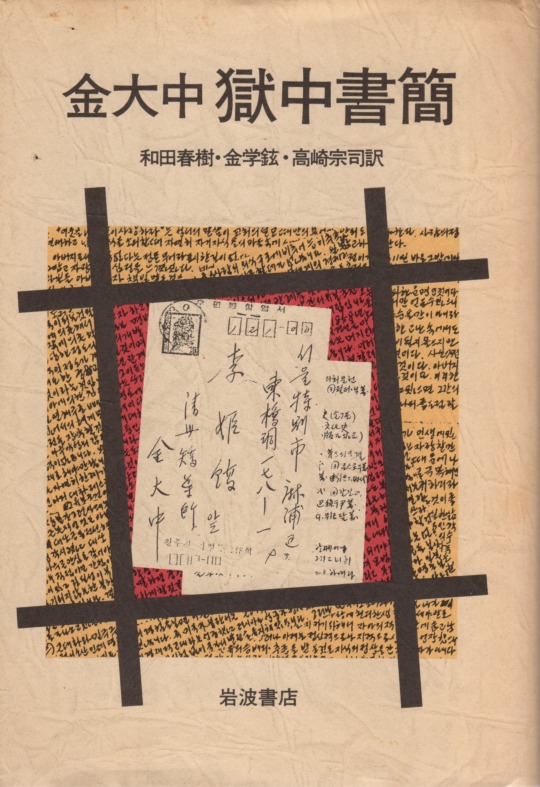
金大中 獄中書簡 和田春樹・金学鉉・高崎宗司=訳 岩波書店
15 notes
·
View notes
Text

在校大學生 身體密碼 34D 165cm 50kg 找男約炮,第一次玩這個,有沒有要長期的呢? 想找個長期性伴侶 不進入生活 附近的人可以加我賴 222k9
#台灣#台湾伴游#台湾#台灣約炮#台灣交友約會伴遊#個人工作室#水療#台灣一夜情#台灣女生#台灣學生#台灣外送茶#台灣反差女#苗栗#花蓮#新北#基隆#嘉義#台北#桃園#高雄#台南#民進黨#台中#台東#金門#總統大選#國民黨#賴清德#蔣萬安#蔡英文
834 notes
·
View notes
Text
[Ming Dynasty]Chinese Armor:Life of female general 秦良玉/Qin Liangyu
The only female general recognized by the Chinese Orthodox Histories,The Twenty-Four Histories (Chinese: 二十四史)
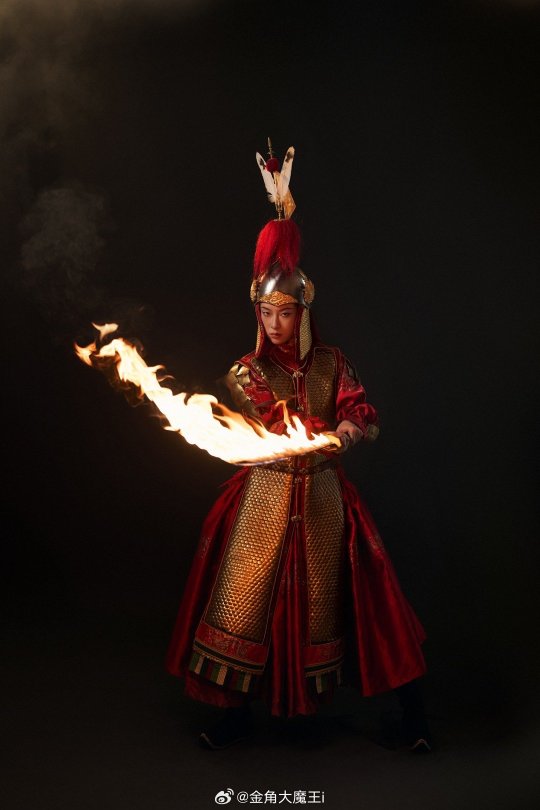
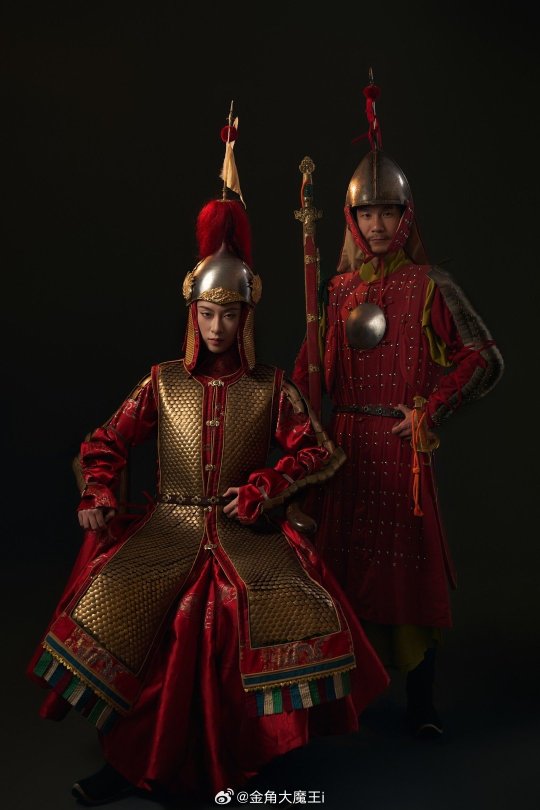
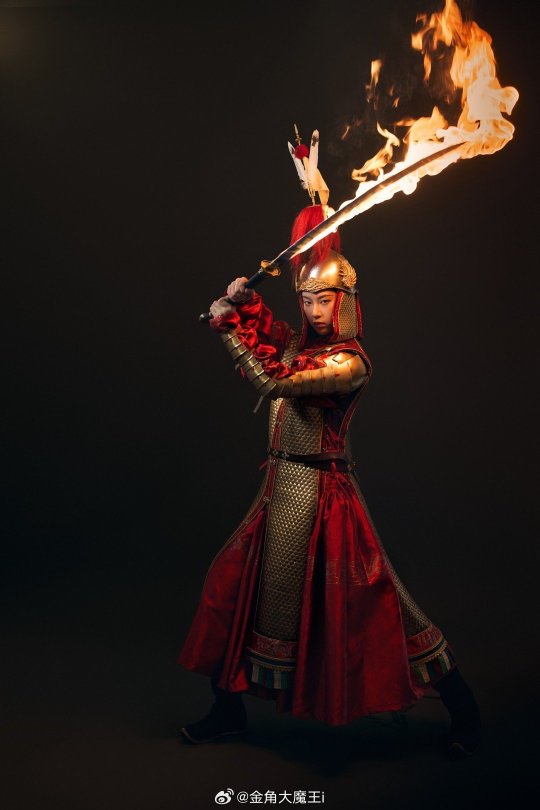
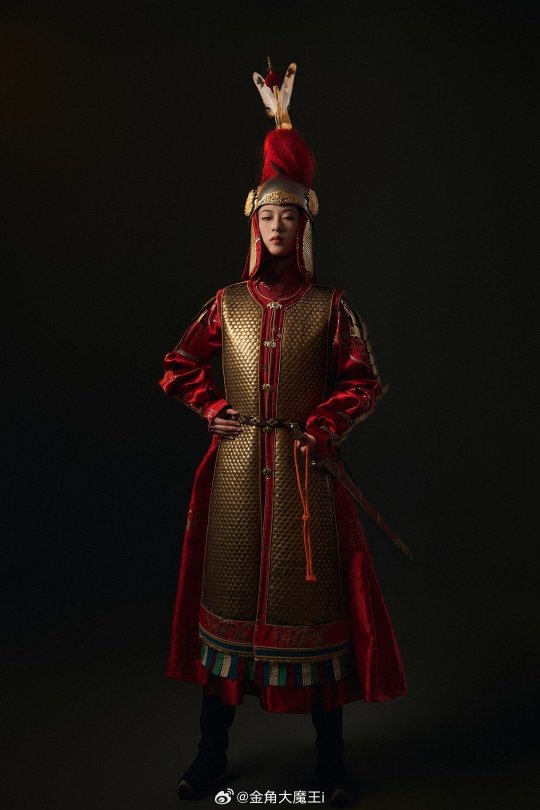
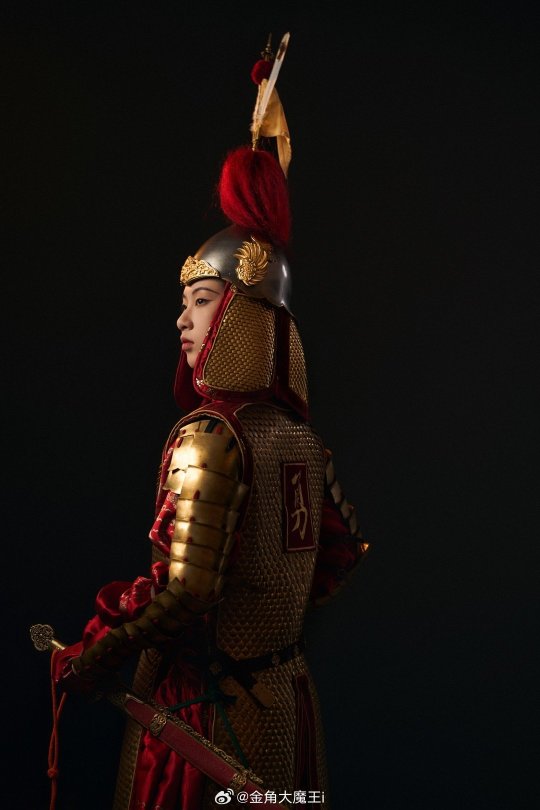
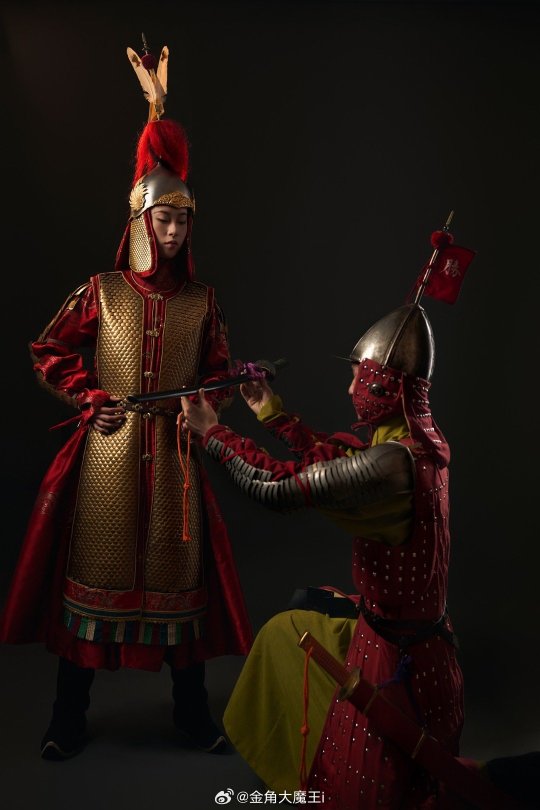
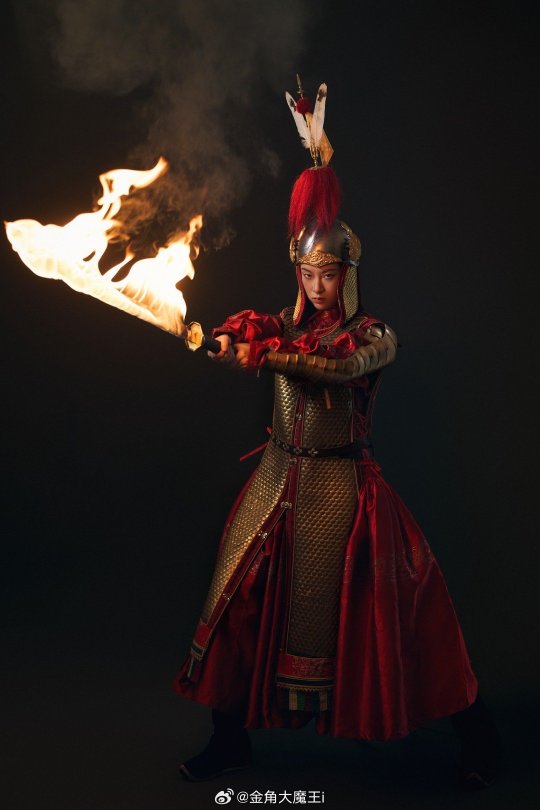
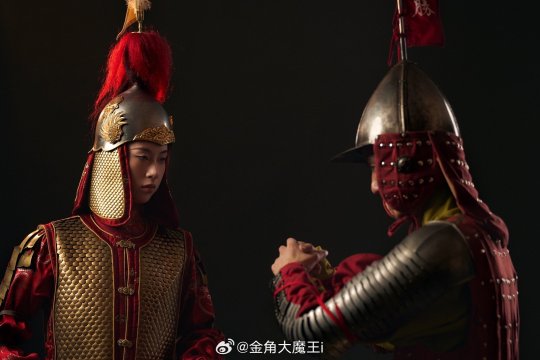
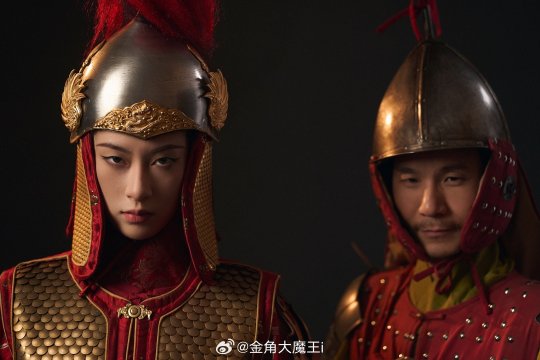
【Historical Artifact Reference】:
China Ming Dynasty Royal Painting:《出警图/Departure Herald》
In this handscroll is a great imperial procession making its way to pay respects at the imperial tombs. Departing from the Te-sheng (Victory) Gate of the Peking city wall, the artists here depicted shops along the way and the appearance of ceremonial guards to the final destination of the imperial tombs, the final resting place for Ming dynasty emperors 45 kilometers from the capital at Mt. T'ien-shou. Departure Herald is actually accompanied by another long handscroll painting entitled Return Clearing. That work depicts the process of the tomb sweeping and inspection tour. Usually considered as a pair, they are collectively known as Departure Herald and Return Clearing.
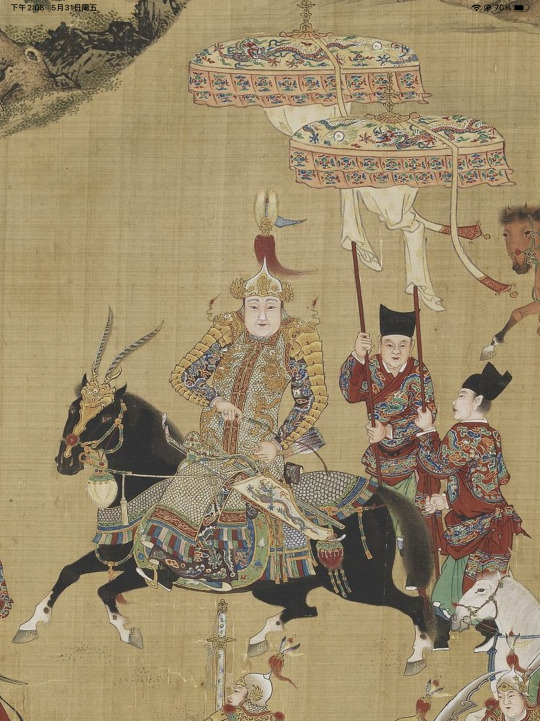
↑Emperor Wanli of the Ming Dynasty of China, Zhu Yijun, wearing armor
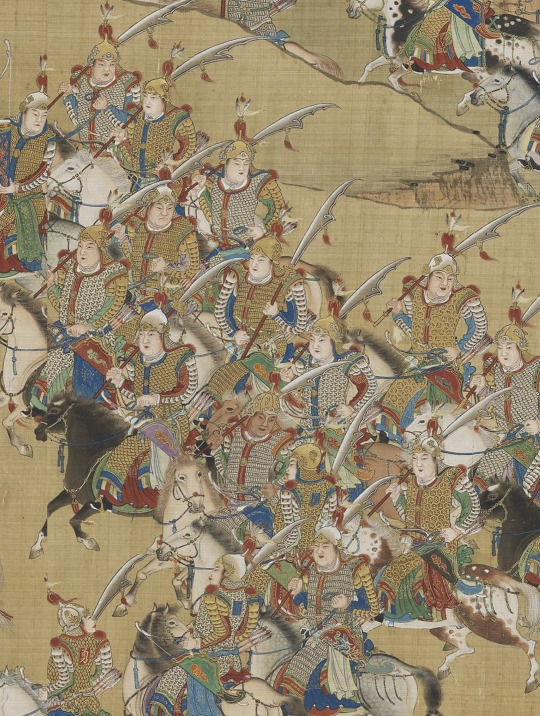
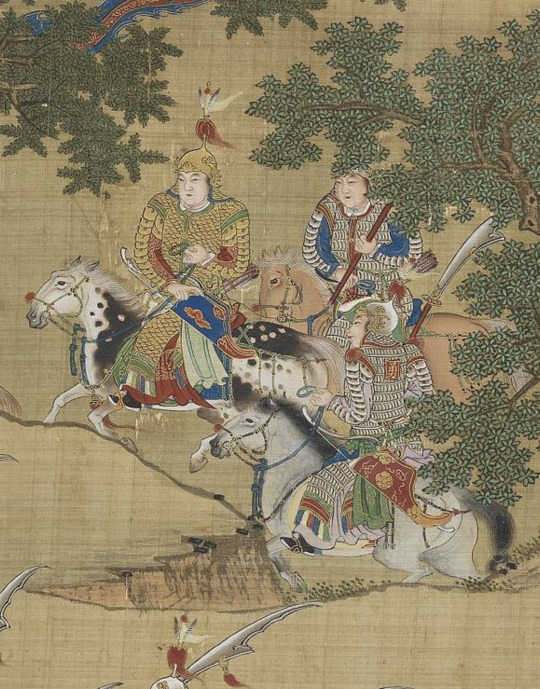
The emperor's guards and ceremonial guards, a good depiction of Ming dynasty armor
【秦良玉/Qin Liangyu:The only female general recognized by the Chinese emperor and official history】
Qin Liangyu (1574–1648), courtesy name Zhensu, was a female general best known for defending the Ming dynasty from attacks by the Manchu-led Later Jin dynasty in the 17th century.
Early life and education
Qin Liangyu was born in Zhongzhou (忠州), which is in present-day Zhong County, Chongqing.Her father, Qin Kui (秦葵), obtained the position of a gongsheng (貢生) in the civil service examination. He believed that girls should receive the same education as boys, so he made Qin Liangyu study history and the Confucian classics with her brothers. He also taught them martial arts. Qin Liangyu learnt martial arts more deeply than her brothers and became proficient in archery and horse-riding. She was also known for her skill in poetry.
Marriage to Ma Qiancheng
In 1595, Qin Liangyu married Ma Qiancheng (馬千乘), the tusi and xuanfushi (宣撫使; "Announcing and Pacifying Commissioner") of Shizhu County, and accompanied him in minor battles against local warlords in the southwestern border of the Ming Empire. They had a good marriage and he often sought her advice.In 1599, when Yang Yinglong (楊應龍) started a rebellion in Bozhou (播州; present-day Zunyi, Guizhou), Ma Qiancheng brought 3,000 riders with him to suppress the revolt while Qin Liangyu brought an additional 500 to support her husband. They successfully quelled the rebellion and destroyed the rebels' camps.
In 1613, Ma Qiancheng offended Qiu Chengyun (邱乘雲), an influential court eunuch, and ended up being arrested and imprisoned. He died in prison later. Qin Liangyu succeeded her husband as the xuanfushi of Shizu County. Those under her command were known as the White Cavalry (白杆兵).
Resisting rebel forces in Sichuan
In 1620, Qin Liangyu's elder brother, Qin Bangping (秦邦屏), led 3,000 White Cavalry to Liaodong to resist invaders from the Manchu-led Later Jin dynasty. He was killed in action at the Battle of Hun River (渾河之戰).
In 1623, Qin Liangyu assisted Ming forces in suppressing the She-An Rebellion in Sichuan and Guizhou led by She Chongming (奢崇明) and An Bangyan (安邦彥). In the following year, her elder brother, Qin Minping (秦民屏), was killed in battle by An Bangyan's forces.
In 1630, when Later Jin forces besieged the Ming capital, Beijing, Qin Liangyu led forces from Sichuan to reinforce the capital. The Chongzhen Emperor showered her with praises in poetry and presented her with four poems as she passed through Beijing. In 1634, when Zhang Xianzhong's rebel army invaded Sichuan, Qin Liangyu and her son, Ma Xianglin (馬祥麟), led their troops to attack the rebels, defeated them at Kuizhou (夔州; present-day Fengjie County, Chongqing) and drove them away. In 1640, Qin Liangyu defeated another rebel force led by Luo Rucai (羅汝才) in Kuizhou and Wushan. In recognition of her contributions to the Ming Empire, the Chongzhen Emperor appointed her as the Crown Prince's Guardian (太子太保) and awarded her the title "Marquis Zhongzhen" (忠貞侯; lit. "Loyal and Chaste Marquis").
Later life and death
The Ming Empire was overthrown in 1644 by rebel forces led by Li Zicheng, and its former territories were conquered by the Later Jin dynasty (later renamed to Qing dynasty). Some Ming loyalists formed a remnant state, the Southern Ming dynasty, in southern China to resist the Qing dynasty. Its nominal ruler, the Longwu Emperor, also granted Qin Liangyu a marquis title. Meanwhile, Zhang Xianzhong invaded Sichuan again, and Qin Liangyu attempted to resist him, but was defeated and forced to retreat, allowing Zhang to conquer most of Sichuan. She did however prevent her soldiers from surrendering to Zhang.
Qin Liangyu controlled part of Shizhu County and her policy of agricultural self-sufficiency made her region attractive for refugees. She helped about 100,000 refugees to settle down in Shizhu.
Qin Liangyu died in 1648 and was buried in present-day Yachun Village, Dahe District, Shizhu County, Chongqing. She was given the posthumous name "Zhongzhen" (忠貞; lit. "Loyal and Chaste") and was survived by her son, Ma Xianglin (馬祥麟).
Legacy
Qin Liangyu's life, along with her weapons and armour, is showcased in a museum in Shizhu County, Chongqing. A statue of her is in the Ganyu Hall of the Shibaozhai in Zhong County (that was preserved during the Three Gorges Project).Together with Hua Mulan, Liang Hongyu and He Yufeng, Qin Liangyu is one of the most well-known female warriors and heroines in China.
In the Twenty-Four Histories, Qin Liangyu was also the only woman whose biography was listed among the biographies of court officials and generals.
________________
📸Photo & Model :@金角大魔王i & @爱穿汉服的曠先生
🔗Weibo:https://weibo.com/1763668330/O3aKR4CSv
________________
#chinese hanfu#Chinese Armor#Female General#秦良玉/Qin Liangyu#hanfu#hanfu accessories#hanfu_challenge#chinese traditional clothing#china#chinese#chinese history#china history#漢服#汉服#中華風#金角大魔王i
365 notes
·
View notes
Text

在校大學生身體密碼34D 165cm 50kg 短期下海,想找一個愛乾淨,心裡健康,互相滿足的,可以先試試,如果合適的話可以做長期的炮友,希望找到一個只進入身體,不打擾生活的x夥伴……… 加我賴: 777k8
#台灣#台灣約炮#台灣交友約會伴遊#個人工作室#水療#台灣一夜情#台灣女生#台灣學生#台灣外送茶#台灣反差女#苗栗#花蓮#新北#基隆#嘉義#台北#桃園#高雄#台南#民進黨#台中#台東#金門#總統大選#國民黨#賴清德#蔣萬安#蔡英文#馬英九
65 notes
·
View notes
Text


#JO1#川西拓実#木全翔也#金城碧海#FANTASTICS#佐藤大樹#中島��太#瀬口黎弥#kawanishi takumi#kimata syoya#kinjo sukai#sato taiki#nakajima sota#seguchi leiya
12 notes
·
View notes
Text

本人是馬來西亞華人22歲在台灣讀書 最近缺錢想找一個長久的伴侶 哥哥弟弟都可以 一夜情 或者兩小時的愛情 有誠意的可以加我LINE aihao879 沒誠意的請走開
#台灣按摩舒壓養生#台北#台灣女生#台灣#台灣交友約會伴遊#台灣一夜情#台灣叫小姐#台灣外送茶#總統大選#台中茶莊#台湾伴游#台湾#台灣約炮#個人工作室#水療#台灣學生#台灣反差女#苗栗#花蓮#新北#基隆#嘉義#桃園#高雄#台南#民進黨#台中#台東#金門#國民黨
3 notes
·
View notes
Video
缅甸澳门风范/官网:tl10215.com/钉钉:as1206668/飞机@aw0654
2 notes
·
View notes
Photo

(河合優実×金子大地インタビュー映像公開!映画『ナミビアの砂漠』9月6日(金)より全国ロードショー – Tokyo Nowから)
4 notes
·
View notes
Quote
中国大陸の歴史で漢民族は何千年も異民族に支配されて来た
夏朝はタイ系が支配者
殷朝は北狄
隋朝は鮮卑
唐朝も鮮卑
遼朝は契丹
金朝は女真
元朝はモンゴル
清朝は女真の末裔の満洲族
中共に国として「4000年の歴史」などは存在しない https://shinjihi.hatenablog.com/entry/2022/02/13/175403 #六四天安門
https://shinjihi.hatenablog.com/entry/2022/02/13/175403
16 notes
·
View notes
Text
App Store 上的“乐网网球”《www.379973.com》 微信:ylyl520066
🏆 16年实体老赌场 资金安全干净 大额提款无忧 无须绑卡 /身份证 隐秘性更强 娱乐更加放心🏆 游戏项目;体育 真人 彩票 棋牌 电子 捕鱼应有尽有
🔰 上下分支持: USDT 💸银行卡💸 支付宝💸 缅币 💸KBZpay 负责人TG✈️ https://t.me/Xioayuan355 综合游戏链接 : www.379973.com 负责人微信:ylyl520066
华纳国际实体娱乐平台线上线下视频大厅保证安全客户在线 缅甸华纳国际全真人实体娱乐博彩赌场【华纳国际大型实体娱乐网投】 推荐注册 … 网上网投百家乐攻略网上网投正规实体平台网上网投真人视讯赌场网上网投线上娱乐公司 微信:yushuneng353
#赌场#白宫赌场#网上博彩靠谱吗#在线赌场#菲律宾赌场#网络赌博被黑怎么办#银钻娱乐#新百胜娱乐#腾龙娱乐#百家乐龙虎斗牛#澳门赌场#新加坡赌场#缅甸赌场#美国赌场#威尼斯赌场#拉斯维加斯赌场#网络博彩#BC电子游戏���全#HN综合游戏网址#博彩游戏注册地址#彩票#中国彩票#博彩游戏大全#龙虎游戏#棋牌游戏#炸金花#麻将糊了#棋牌游戏的魅力
2 notes
·
View notes
Text
首款AG亚游捕鱼《深海大赢家》今日公测!《www.379973.com》 微信:ylyl520066
HN EAST国际真人娱乐网站✓【综合盘注册游戏网址379973.com】复制网址到浏览器打开即可注册。)负责人微信:ylyl520066 【电报 https://t.me/Xioayuan355 】(✓为您提供保障安全、多元娱乐、便捷支付的娱乐平台,方便您能更好的体验我们的游戏。
本公司支持:支付宝微信USDT银行卡人民币缅币充值。
大家✅推荐现场玩手机玩电脑玩☞下载游戏app登入,和现场客户一起下注。☞24小时为您办理上分下分服务。
华纳国际实体娱乐平台线上线下视频大厅保证安全客户在线 缅甸华纳国际全真人实体娱乐博彩赌场【华纳国际大型实体娱乐网投】 推荐注册 … 网上网投百家乐攻略网上网投正规实体平台网上网投真人视讯赌场网上网投线上娱乐公司 微信:yushuneng353
2 notes
·
View notes
Text

個人工作室特價:3000 美腿性感美魔女 加賴 222k9 特點:身材窈窕 雙乳粉嫩 誘人 接額吉笑起來迷人 臉蛋氣質 好聊天 喜歡一起洗澡 在浴室打炮 在性愛的時候不會趕時間 會把哥哥們直接撲倒在床上 開始進入主題的饑渴姐姐
#台灣#台湾伴游#台湾#台灣約炮#台灣交友約會伴遊#個人工作室#水療#台灣一夜情#台灣女生#台灣學生#台灣外送茶#台灣反差女#苗栗#花蓮#新北#基隆#嘉義#台北#桃園#高雄#台南#民進黨#台中#台東#金門#總統大選#國民黨#賴清德#蔣萬安#蔡英文
280 notes
·
View notes
Text
[Hanfu · 漢服]Chinese Western Han (202 BC – 9 AD) Traditional Clothing Hanfu Photoshoot
“这个位子 我有何坐不得?” “我欲问鼎天下,试问谁与争锋”
"Why can't I sit in this seat?"
"I want to conquer the world, who can compete with me?"
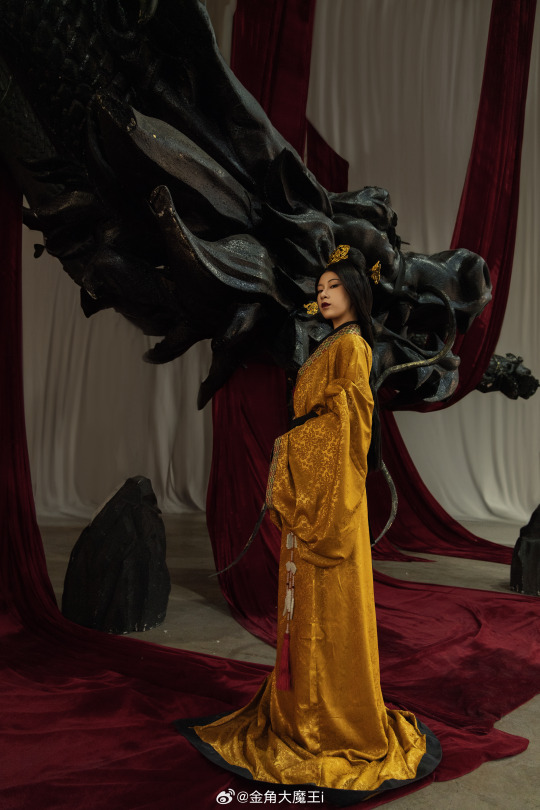
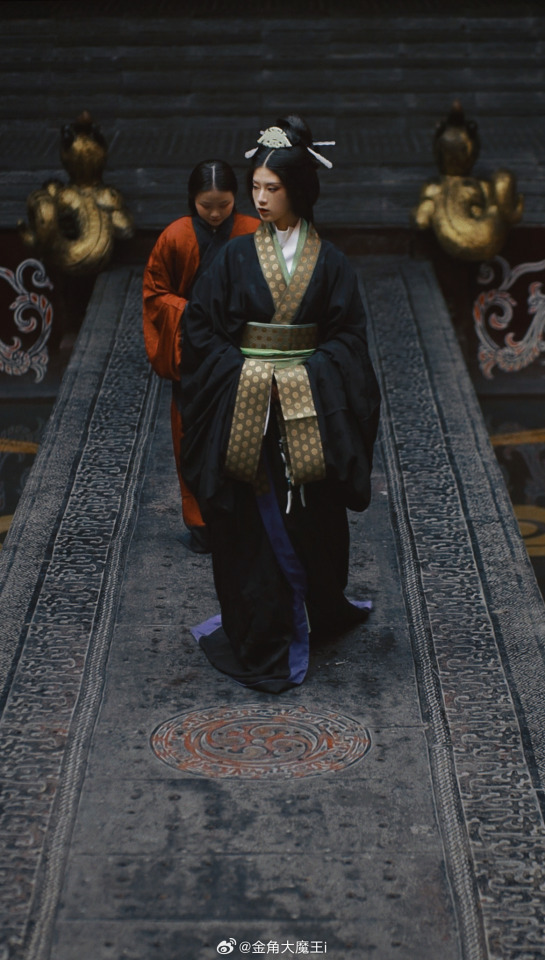
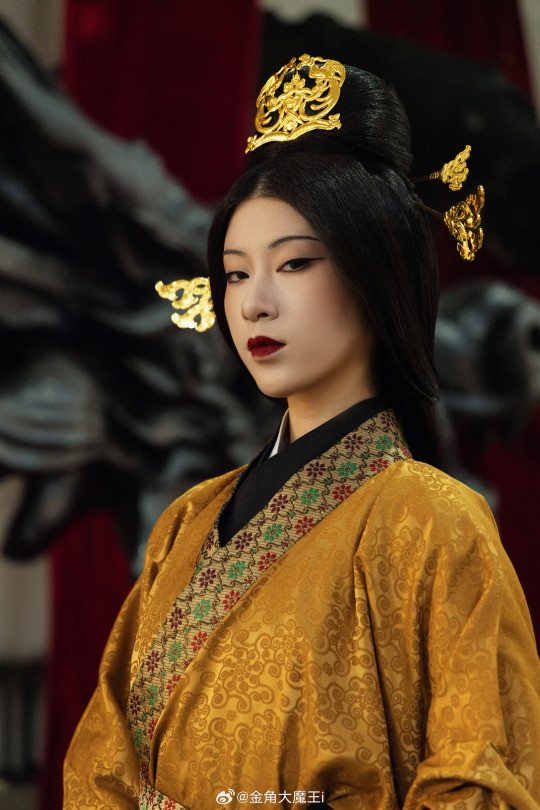
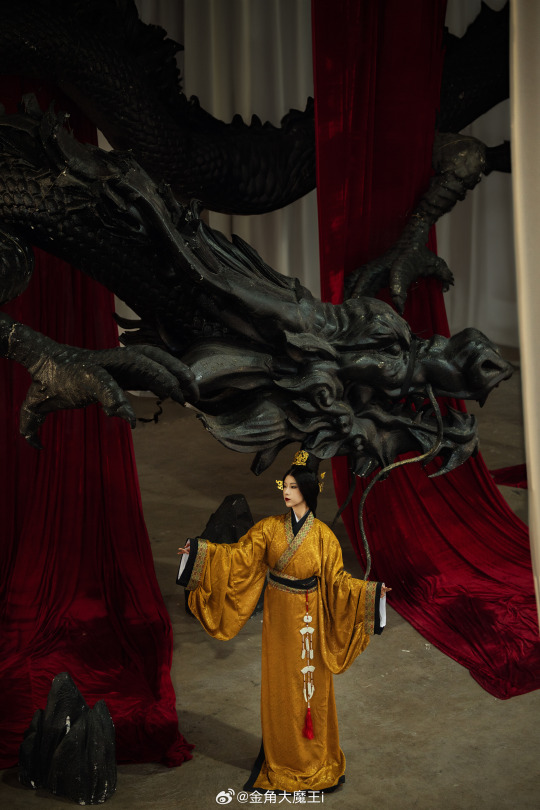

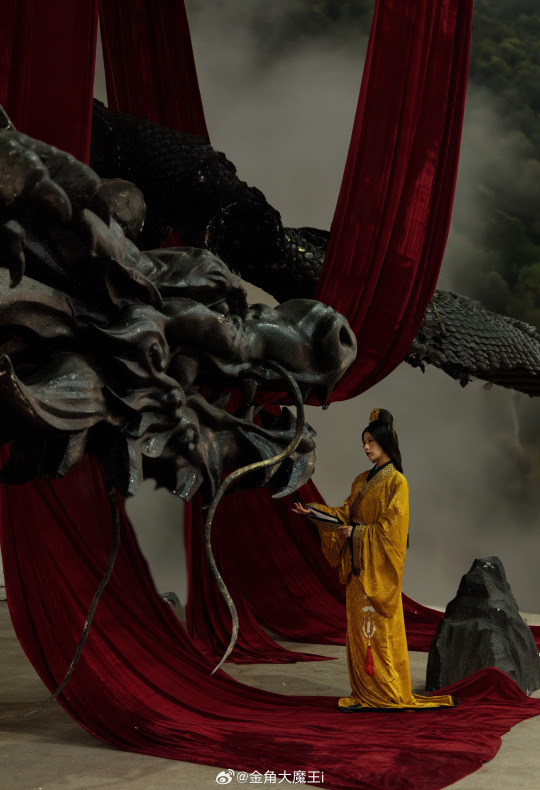


【About The First Empress of the Han Dynasty Empress Lü:Lǚ zhì(吕雉)】
Lü Zhi (241–18 August 180 BC), courtesy name E'xu (娥姁) and commonly known as Empress Lü (traditional Chinese: 呂后; simplified Chinese: 吕后; pinyin: Lǚ Hòu) and formally Empress Gao of Han (漢高后; 汉高后; Hàn Gāo Hòu), was the empress consort of Gaozu, the founding emperor of the Han dynasty. They had two known children, Liu Ying (later Emperor Hui of Han) and Princess Yuan of Lu. Lü was the first woman to assume the title Empress of China and paramount power. After Gaozu's death, she was honoured as empress dowager and regent during the short reigns of Emperor Hui and his successors Emperor Qianshao of Han and Liu Hong (Emperor Houshao).
She played a role in the rise and foundation of her husband, Emperor Gaozu, and his dynasty, and in some of the laws and customs laid down by him. Empress Lü, even in the absence of her husband from the capital, killed two prominent generals who played an important role in Gaozu's rise to power, namely Han Xin and Peng Yue, as a lesson for the aristocracy and other generals. In June 195 BC, with the death of Gaozu, Empress Lü became, as the widow of the late emperor and mother of the new emperor, Empress Dowager (皇太后, Huángtàihòu), and assumed a leadership role in her son's administration. Less than a year after Emperor Hui's accession to the throne, in 194 BC, Lü had one of the late Emperor Gaozu's consorts whom she deeply hated, Concubine Qi, put to death in a cruel manner. She also had Concubine Qi's son Liu Ruyi poisoned to death. Emperor Hui was shocked by his mother's cruelty and fell sick for a year, and thereafter no longer became involved in state affairs, and gave more power to his mother. As a result, Empress dowager Lü held the court, listened to the government, spoke on behalf of the emperor, and did everything (臨朝聽政制, "linchao ting zhengzhi"). With the untimely death of her 22-year-old son, Emperor Hui, Empress dowager Lü subsequently proclaimed his two young sons emperor (known historically as Emperor Qianshao and Emperor Houshao respectively). She gained more power than ever before, and these two young emperors had no legitimacy as emperors in history; the history of this 8-year period is considered and recognized as the reign of Empress Dowager Lü. She dominated the political scene for 15 years until her death in August 180 BC, and is often depicted as the first woman to have ruled China. While four women are noted as having been politically active before her—Fu Hao, Yi Jiang, Lady Nanzi, and Queen Dowager Xuan—Lü was the perhaps first woman to have ruled over united China.
Lü Zhi was born in Shanfu County (單父; present-day Shan County, Shandong) during the late Qin Dynasty. Her courtesy name was Exu (Chinese: 娥姁; pinyin: Éxǔ). To flee from enemies, her father Lü Wen (呂文) brought their family to Pei County, settled there, and became a close friend of the county magistrate. Many influential men in town came to visit Lü Wen. Xiao He, then an assistant of the magistrate, was in charge of the seating arrangement and collection of gifts from guests at a banquet in Lü Wen's house, and he announced, "Those who do not offer more than 1,000 coins in gifts shall be seated outside the hall." Liu Bang (later Emperor Gaozu of Han), then a minor patrol officer (亭長), went there bringing a single cent and said, "I offer 10,000 coins." Lü Wen saw Liu Bang and was so impressed with him on first sight, that he immediately stood up and welcomed Liu into the hall to sit beside him. Xiao He told Lü Wen that Liu Bang was not serious, but Liu ignored him and chatted with Lü. Lü Wen said, "I used to predict fortunes for many people but I've never seen someone so exceptional like you before." Lü Wen then offered his daughter Lü Zhi's hand in marriage to Liu Bang and they were wed. Lü Zhi bore Liu Bang a daughter (later Princess Yuan of Lu) and a son, Liu Ying (later Emperor Hui of Han).
Liu Bang later participated in the rebellion against the Qin Dynasty under the insurgent Chu kingdom, nominally-ruled by King Huai II. Lü Zhi and her two children remained with her father and family for most of the time during this period.
Even after Emperor Gaozu (Liu Bang)'s victory over Xiang Yu, there were still unstable areas in the empire, requiring the new government to launch military campaigns to pacify these regions thereafter. Gaozu placed Empress Lü Zhi and the crown prince Liu Ying (Lü Zhi's son) in charge of the capital Chang'an and making key decisions in court, assisted by the chancellor Xiao He and other ministers. During this time, Lü Zhi proved herself to be a competent administrator in domestic affairs, and she quickly established strong working relationships with many of Gaozu's officials, who admired her for her capability and feared her for her ruthlessness. After the war ended and Emperor Gaozu returned, she remained in power and she was always influential in many of the country's affairs.
In his late years, Emperor Gaozu started favouring one of his younger consorts, Concubine Qi(戚夫人), who bore him a son, Liu Ruyi, who was instated as Prince of Zhao in 198 BC, displacing Lü Zhi's son-in-law Zhang Ao (Princess Yuan of Lu's husband). Gaozu had the intention of replacing Liu Ying with Liu Ruyi as crown prince, reasoning that the former was too "soft-hearted and weak" and that the latter resembled him more. Since Lü Zhi had strong rapport with many ministers, they generally opposed Gaozu's decision but the emperor seemed bent on deposing Liu Ying. Lü Zhi became worried and she approached Zhang Liang for help, and the latter analysed that Gaozu was changing the succession on grounds of favouritism. Zhang Liang invited the "Four Whiteheads of Mount Shang", a group of four reclusive wise men, to persuade Gaozu to change his decision. The four men promised to assist Liu Ying in future if he became emperor, and Gaozu was pleased to see that Liu Ying had their support. Gaozu told Concubine Qi, "I wanted to replace (the crown prince). Now I see that he has the support of those four men; he is fully fledged and difficult to unseat. Empress Lü is really in charge!" This marked the end of the dispute over the succession and affirmed Liu Ying's role as crown prince.
In June 195 BC, Emperor Gaozu died and was succeeded by Liu Ying, who became historically known as Emperor Hui of Han. Lü Zhi was honoured by Emperor Hui as empress dowager. She exerted more influence during the reign of her son than she had when she was empress, and she became the powerful and effective lead figure in his administration.
Lü Zhi did not harm most of Gaozu's other consorts and treated them according to the rules and customs of the imperial family. For example, consorts who bore male children that were instated as princes were granted the title of "Princess Dowager" (王太妃) in their respective sons' principalities. One exception was Concubine Qi, whom Lü Zhi greatly resented because of the dispute over the succession between Liu Ruyi (Qi's son) and Liu Ying. Liu Ruyi, the Prince of Zhao, was away in his principality, so Lü Zhi targeted Concubine Qi. She had Qi stripped of her position, treated like a convict (head shaved, in stocks, dressed in prison garb), and forced to do hard labour in the form of milling rice.
Roles in the deaths of Concubine Qi and Liu Ruyi
Lü Zhi then summoned Liu Ruyi, who was around the age of 12 then, to Chang'an, intending to kill him together with his mother. However Zhou Chang (周昌), the chancellor in Liu Ruyi's principality, whom Lü Zhi respected because of his stern opposition to Emperor Gaozu's proposal to make Liu Ruyi crown prince, temporarily protected Liu Ruyi from harm by responding to Lü Zhi's order that, "The Prince of Zhao is ill and unfit for travelling over long distances." Lü Zhi then ordered Zhou Chang to come to the capital, had him detained, and then summoned Liu Ruyi again. Emperor Hui tried to save Liu Ruyi by intercepting his half-brother before the latter entered Chang'an, and kept Liu Ruyi by his side most of the time. Lü Zhi refrained from carrying out her plans for several months because she feared that she might harm Emperor Hui as well.
One morning in the winter of 195-194 BC, Emperor Hui went for a hunting trip and did not bring Liu Ruyi with him because the latter refused to get out of bed. Lü Zhi's chance arrived, so she sent an assassin to force poisoned wine down Liu Ruyi's throat. The young prince was dead by the time Emperor Hui returned. Lü Zhi then had Concubine Qi killed in an inhumane manner: she had Qi's limbs chopped off, eyes gouged out, ears sliced off, nose sliced off, tongue cut out, forced her to drink a potion that made her mute, and had her thrown into a latrine. She called Qi a "human swine" (人彘). Several days later, Emperor Hui was taken to view the "human swine" and was shocked to learn that it was Concubine Qi. He cried loudly and became ill for a long time. He requested to see his mother and said, "This is something done not by a human. As the empress dowager's son, I'll never be able to rule the empire" From then on, Emperor Hui indulged himself in carnal pleasures and ignored state affairs, leaving all of them to his mother, and this caused power to fall completely into her hands.
When Lu first came to the court, she planned to establish the Lu family members as "kings (nobles)". This was not only to commemorate her deceased relatives, but also to strengthen her power in the court. However, Wang Ling, the prime minister at the time, immediately pointed out that the great ancestor Liu Bang(Husband of Lu, founding emperor of Han Dynasty)once killed the white horse and agreed that "if someone who are not Liu family be come the king, the whole world should attack them." Therefore, the move of establishing a foreign surname as the king violated the ancestral system established by Liu Bang and was really inappropriate.
Faced with the obstruction of Wang Ling, Empress Lu responded by deposing him and insisting on honoring her deceased father and two brothers as King Lu Xuan, King Wu Wu, and King Zhao Zhao. After setting this precedent, Lu was out of control. She not only named her three nephews Lu Tai, Lu Chan, and Lu Lu as King Lu, King Liang, and King Zhao respectively, but also named her grandnephew Lu Tong. He was the King of Yan, and his grandson Zhang Yan was granted the title of King of Lu.
In addition, there are also quite a few people with the surname Lu who have been granted the title of marquis. As a result, it can be said that many princes surnamed Lu appeared in the court in the blink of an eye. They controlled the government and became the cornerstone and support for Empress Lu to control the right to speak in the court.
Empress Lu's life was emblematic of the intricate power dynamics of the Han Dynasty in ancient China. Born into a modest family, Lu rose to prominence through her marriage to Emperor Gaozu. Her astute political acumen and strategic alliances allowed her to wield significant influence behind the throne. As the mother of several emperors, she orchestrated their ascensions and manipulated court politics to consolidate power for her family. However, her ruthless pursuit of control and elimination of rivals earned her both admirers and enemies. In the end, her ambitions led to her downfall, as her unchecked power and manipulation of succession angered the nobility.As a result, after her death, the Lu family was retaliated and killed by the nobles and courtiers who supported the Han Dynasty, and the family was almost exterminated.Empress Lu's life illustrates the delicate balance of power, ambition, and intrigue in ancient Chinese imperial courts.
Literati in every dynasty in China often likened women who attempted to participate in government affairs and influence national policies to Empress Lü, saying they were vicious. One of them was Wu Zetian, the first official female emperor of China. However, compared with Empress Lü, Wu Zetian was more talented. Unlike Empress Lü, who was simply vicious, she ignored the system and stability of the empire and put personal and family interests first.
________________
📸Photo & Model :@金角大魔王i
🔗Weibo:https://weibo.com/1763668330/NFVOXthxX
________________
#chinese hanfu#Western Han (202 BC – 9 AD)#hanfu#Empress Lü#Lǚ zhì(吕雉)#china history#chinese history#hanfu accessories#hanfu_challenge#chinese traditional clothing#china#chinese#woman in history#漢服#汉服#中華風#金角大魔王i#historical fashion
328 notes
·
View notes
Text

台灣約妹主推 個人工作室 一對一按摩服務 璐璐 23歲 165cm 48kg 34D 極品好身材 翹臀性感 敢玩敢露 淫蕩水多 內裝美麗 還有馬甲線哦 可以69 女上位 火車便當 老漢推車 品飽 親親 翹臀後入式超級爽哦!
#台灣#台灣約炮#台灣交友約會伴遊#個人工作室#水療#台灣一夜情#台灣女生#台灣學生#台灣外送茶#台灣反差女#苗栗#花蓮#新北#基隆#嘉義#台北#桃園#高雄#台南#民進黨#台中#台東#金門#總統大選#國民黨#賴清德#蔣萬安#蔡英文#馬英九
20 notes
·
View notes
Text

from taiki's x
#JO1#川西拓実#木全翔也#金城碧海#FANTASTICS#佐藤大樹#中島颯太#瀬口黎弥#kawanishi takumi#kimata syoya#kinjo sukai#sato taiki#nakajima sota#seguchi leiya
8 notes
·
View notes
